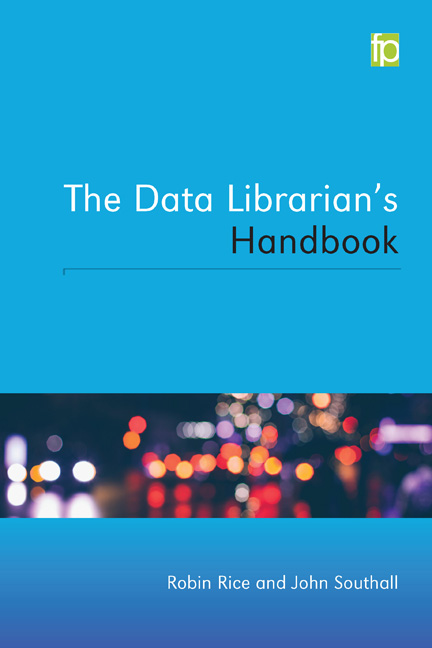Book contents
- Frontmatter
- Contents
- Acknowledgements
- Preface
- 1 Data librarianship: responding to research innovation
- 2 What is different about data?
- 3 Supporting data literacy
- 4 Building a data collection
- 5 Research data management service and policy: working across your institution
- 6 Data management plans as a calling card
- 7 Essentials of data repositories
- 8 Dealing with sensitive data
- 9 Data sharing in the disciplines
- 10 Supporting open scholarship and open science
- References
- Index
9 - Data sharing in the disciplines
Published online by Cambridge University Press: 08 June 2018
- Frontmatter
- Contents
- Acknowledgements
- Preface
- 1 Data librarianship: responding to research innovation
- 2 What is different about data?
- 3 Supporting data literacy
- 4 Building a data collection
- 5 Research data management service and policy: working across your institution
- 6 Data management plans as a calling card
- 7 Essentials of data repositories
- 8 Dealing with sensitive data
- 9 Data sharing in the disciplines
- 10 Supporting open scholarship and open science
- References
- Index
Summary
Culture change in academia
To work in research support is to be immersed in culture change, sometimes fast, sometimes slow. The arrival of a killer app or new technology may seem to transform the way research is conducted in a given field very quickly. On the other hand, universities have existed for centuries, and knowledge and research know-how are passed on from teacher to student in time-honoured fashion. Tradition slows down culture change, and minimizes effects of external factors on researchers’ behaviour, such as the use of social media.
For example, young researchers who may not think twice about sharing aspects of their private life on social media may learn to be very guarded about revealing their data. This may be the case if their discipline's norms are to consider data to be a kind of capital, on which to fashion one's career. This is not wholly bad in itself, because it may protect them from jeopardizing their chances of getting published – for which an original work is usually required. Indeed, the Belmont Forum's Open Data Survey found that younger researchers were more concerned about being able to publish results before releasing data than older researchers (Schmidt, Gemeinholzer and Treloar, 2016, 6–7).
So we tend to find that innovations in scholarly communication can take a generation or more to take root. For this reason librarians are often in the difficult position of championing scholarly innovations to research communities that seem stubbornly resistant to change. In these circumstances it can be challenging to find the right balance of patience and initiative. A support network of peers within your institution or in the wider world is therefore highly recommended!
In the social sciences
In our first chapter we discussed the history of data libraries and data archives, and the strong economic motivation of social scientists for getting access to large-scale survey and population census data collected by government agencies. The prevalence of data sharing for social scientists then are often focused on the receiving end of sharing. Large-scale academic surveys and longitudinal studies, known to be rich sources for re-use and funded with an expectation they will become resources for the wider community, are an exception.
- Type
- Chapter
- Information
- The Data Librarian's Handbook , pp. 137 - 146Publisher: FacetPrint publication year: 2016



